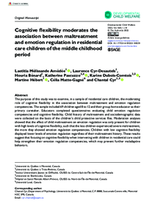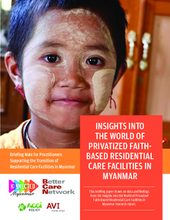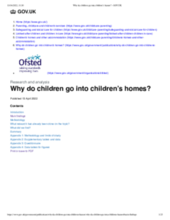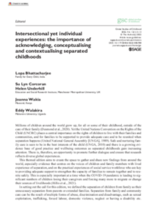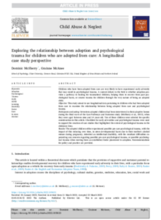Displaying 81 - 90 of 713
Previous studies have shown that mental health disorders (MHD) among parents might be an important mechanism in the intergenerational transmission of out-of-home care (OHC). The current study aimed to further study this interplay by investigating the associations between OHC and MHD within and across generations in a Swedish cohort.
This study provides an overview of the family reunification process of Latinx adolescents who have migrated to join their families in the United States.
The purpose of this study was to examine, in a sample of residential care children, the moderating role of cognitive flexibility in the association between maltreatment and emotion regulation competencies. The sample included 69 children aged 8 to 12 and their group home educator as their primary caretaker. Educators completed questionnaires evaluating child emotion regulation competencies and cognitive flexibility.
This briefing paper draws on data and findings from the Insights into the World of Privatized Faith-Based Residential Care Facilities in Myanmar research report.
This study focused on Israeli care leavers a decade after leaving care and explored various factors associated with satisfaction with both intimate relationships and parenthood.
This study looked at how well matched children in England are to their homes and the extent to which their participation, views, wishes and feelings are considered in the decision-making process. The study looked at a small group of children who have a very wide and diverse set of needs and who live in children’s homes that were visited by Ofsted inspectors in late 2019.
In this editorial published in the special edition of the Global Studies of Childhood journal focused on separated childhoods in April 2022, the authors aim to create the space to gather and share new findings from around the world, especially evidence that centres on the voices of children and family members with lived experience of separation, and on the practical experiences of social service workforce who are key to providing adequate support to strengthen the capacity of families to remain together and to reunite safely.
Typical large-group institutions for abandoned children or orphans are known to be bad for the development of children, but what about small-group care?
This study aimed to use longitudinal data pertaining to children who had been adopted from care to examine the relationship between being adopted from care and psychological trauma.
Separation and loss characterise a child’s experience in care, yet losses in the care-experienced population have rarely been studied as a possible source of trauma or as events that may justify a grief response. A literature search of five databases yielded 592 publications. 41 full text articles were reviewed, 16 publications were included. Thematic analysis revealed: children in care are affected by two broad type of ambiguous loss, relationship losses and psychosocial losses; behaviours labelled as ‘problem’ behaviours may in fact be indicators of the manifestations of ambiguous loss and disenfranchised grief; manifold ambiguous losses associated with multiple placement moves has a cumulative effect that can generate long-term negative consequences; the effects of ambiguous loss can be offset by supporting children in care to understand that their losses may not be resolvable, to build tolerance to this ambiguity, to rebuild their identity through forging permanent connections, and to make meaning of their situations.

